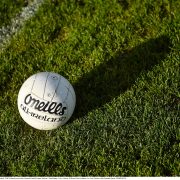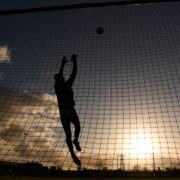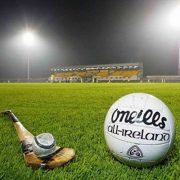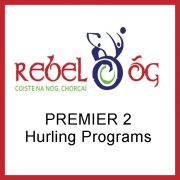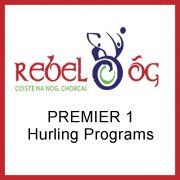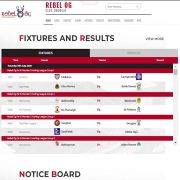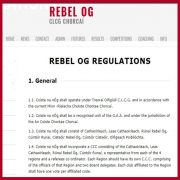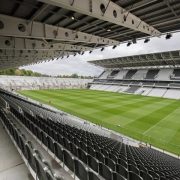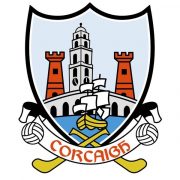Archive for month: July, 2020
https://gaaportal.ergogroup.ie/prod/gaaportal/sign-in
The smiles can be seen everywhere as players are back doing what they like to do best – playing games and training.
Coaches can be heard issuing instructions during training sessions as all clubs and Rebel Óg regions prepare for the return of games from today (July 17) onwards. No doubt a few parents are only too delighted as well to ‘escape’ from their young ones for a few hours!
The last couple of months have been difficult for everyone and we must not forget all those who have made personal sacrifices during the pandemic. Sadly people have lost loved ones and long after the pandemic is but a memory they will still be mourned.
Throughout these strange times, GAA clubs across Cork have shown their community spirit and have helped out with countless jobs, from grocery deliveries, cutting grass, and medical collections to many more jobs for those cocooning or self-isolating.
We must also remember the countless number of GAA people working on the frontline and we thank them for their efforts.
That work will continue but now it is time for games to recommence and get back to the pitches where the cries of ‘my ball’, ‘great save’, ‘unlucky go again’ and ‘great score’ will be heard on pitches from Youghal to Beara and all in between, in the coming weeks.
Players simply love playing and the vast array of games that Rebel Óg are organising will see them get every opportunity to do so from today to the start of October.
In that time span, hundreds of games will take place from U12 to minor at different levels across the county.
Rebel Óg has put a plan in place to ensure there are games to cater to players of all abilities. Considering the short playing window, just over 12 weeks, this has not been an easy task.
Tough decisions had to be made and the plan in place should ensure plenty of games for all players.
With the pandemic, it was decided to try and make this a fun year for players, a theme that the President of the GAA suggested on TV one night when he said just let them go out and enjoy themselves.
So with that in mind, there will be a league structure for U14 and U16s, with finals at the end.
At minor level there will be a championship, to acknowledge the players that will be leaving the underage structure at the end of the season.
All fixtures across the regions are now on this website.
So for now let’s all come together and raise a sliothar/football to all who have made sacrifices over the last few months and to all who have helped to get us back on the pitches.
As the saying goes – let the games commence – and let’s hope the cry of MY BALL is heard all across the county.
Thanking you for all the work you have done so far in getting our young players ready for games on behalf of Rebel Og Coiste na nÓg.
Introduction: These Regulations have been drawn up by An Lár Choiste Cheannais na gComortaisí and approved by An Coiste Bainistíochta (09.07.2020) as the basis for County Match Regulations during the Covid-19 Emergency. Counties can add additional regulations if required.
The Central Competitions Control Committee (CCCC) is mindful of the GAA Give Respect Get Respect campaign and has drawn up these Regulations for the benefit of all stakeholders – players, referees, team management, officials, media, members and spectators.
__________________________________
Sideline Official/Match Monitor – A Sideline Official may be appointed by the Committee-in-Charge and it shall be his duty to report any breaches of these Regulations.
The Committee-in-Charge may also appoint a Match Monitor who shall be responsible for any duties assigned. The Sideline Official shall include in his report any relevant observations or breaches reported to him by the Match Monitor. These will then form part of the Referee’s Report in accordance with Rule 1.6, Rules of Control, T.O. 2020 Cuid II but any errors or omissions in respect of this shall not invalidate the Report as a whole.
The Committee-in-Charge may also impose penalties for breaches of the Regulations brought to its attention by members of the Committee-in-Charge or the Management Committee.
Failure to respect the regulations and follow laid down procedures therein may lead to penalties as defined in General Rule & Section 3 of this document being imposed on individuals, teams, County Committees, or Clubs by the Committees-in-Charge.
__________________________________
-
Ground/Pitch Regulations
1.1 Ground Regulations shall apply to all venues considered suitable for club championships. They shall include procedures for entry to each ground, designated areas for substitutes and Team Officials and shall be communicated to Teams in advance.
1.3 Only a maximum of 24 players (starting 15 and nine-panel members) shall be allowed within the pitch enclosure during the playing of the game.
1.4 A maximum of five (football) & seven (hurling) Team Officials shall be allowed within the pitch Enclosure during the playing of our games. It is suggested that these should include:
- One Bainisteoir
- One Maor Fóirne
- Two Medics
- One Club Official
- Two Maor Camán (Hurling Only)
1.5 Each team shall be allocated a side of the pitch in advance of the game by the Committee-in-Charge, where their team officials and panel of players, as per regulations 1.3 & 1.4, shall be positions during the game.
The Team Officials & Players Zone shall be positioned between the two 20m lines and have fourteen seats which will be positioned to ensure compliance with Government social distancing guidelines (currently 2metres).
Dugouts may be used provided the government guidelines around social distancing are observed.
Where facilities in particular grounds allow for the two teams to be positioned on the same side of the pitch and for social distancing guidelines to be followed, alternative arrangements may be made in advance by the Committee-in-Charge and communicated to the relevant units.
1.6 Where the National Anthem precedes a game, Teams shall stand to attention respectfully facing the flag; helmets must not be worn for Amhrán na bhFiann, for the parade or in team photographs.
1.7 Ball Boys are not permitted.
2. Game Regulations
2.1 The Referee is in overall charge of Game Regulations and shall delegate authority to his Linesmen & Sideline Official; they shall include the Sideline Official/Match Monitor’s report(s) with his match report as appropriate. The Referee has the authority during the game to send any person in breach of these Regulations to the stand/outside the pitch enclosure and such person cannot be replaced.
2.2 All Team Officials in the designated areas must be named on the Official list given to the Referee and may include: Bainisteoir, Maor Fóirne, Medics, Maor Camán (Hurling Only) and Club Official.
2.3 Club Official – Game and Ground regulations apply to all players and officials and adherence to the regulations is the responsibility of the Club Official. The Bainisteoir also shares the responsibility of ensuring that Game Regulations are respected by players and members of team management. They shall also have the responsibility for preparing substitutions slips.
2.4 Bainisteoir – The Bainisteoir shall wear a designated distinctive top and is not permitted to enter the field of play. They may move along the sideline between the two 20m lines as per the “Pitch Layout” on Page 3 of these Regulations. The Bainisteoir may not act in any other capacity (e.g. as Maor Fóirne, etc.).
2.5 Maor Fóirne – The Maor Fóirne (who must be a Selector/Coach) must wear the official approved bib (Yellow or Orange) and may enter the field of play only through the area in front of the team’s designated area, and only when the ball has gone out of play following a score, wide or during a stoppage called by the Referee. He shall exit the field at the nearest point and return to his designated area without interfering with play or opposition personnel.
The role of the Maor Fóirne is to deliver messages to players on their team and any disruption to the playing of the game, challenging the authority of the match officials, interference with opposing players, entry onto the field of play not at a time as listed above or breach of match regulations shall result in their removal from the pitch enclosure and they cannot be replaced for the remainder of the game, included Extra Time.
The Maor Fóirne must not be a listed member of the team panel.
2.6 Selectors – Selectors must be positioned outside the pitch enclosure.
2.7 Medics – Two Medical personnel shall be identified on the Official Team list and shall sit in the areas designated in Ground Regulations; they shall wear clear identification and may only enter the field of play to attend to an injured player(s). Selectors/Coaches cannot act as a medic person, without advance approval from the Committee in Charge. Medical personnel while performing their duties are required to wear PPE.
2.8 Water Breaks – One water break will take place between the 15th & 20thminute in each half, which the referee will signal for only when the ball has gone out of play following a score, wide or during a stoppage called by the Referee.
The breaks should last no longer than a minute, with players coming to the area in front of their team zone and drinking from their own clearly marked bottle.
The time taken for the break will be added to the end of each half as part of the additional time. If a venue has a match clock, it should continue during this time.
Players are permitted to position their clearly marked water bottle around the outside of the pitch.
Maor Uisce are not permitted in either Football or Hurling.
2.9 Maor Camán (Hurley Carriers) – Two Maor Camán who must be over 18 years of age, are permitted per team. Each must wear an official (Brown or Lilac) and will be situated as per the “Pitch Layout” on Page 3 of these Regulations, and at least two metres from the sideline.
Official team personnel (Selectors/Coaches), substitutes, injured players or members of the extended panel may not act as Maor Camán.
Maor Camán are not allowed to carry water into the players and may enter the field of play only with a replacement hurley when necessary.
Any unauthorised entry into the field of play by the Maor Camán or breach of match regulations shall result in their removal from the pitch enclosure and they cannot be replaced for the remainder of the game, included Extra Time.
2.10 Substitutes – Substitutes are not allowed a kick/puck around at half-time. A maximum of three substitutes wearing designated distinctive tops may warm up on sidelines at any one time. A maximum number of 9 substitutes are allowed within the pitch enclosure at any one time. As per rule, there is no limit on the size of a club match day panel.
2.11 Sliotars – Any sliotars not officially approved and displaying the official GAA stamp shall not be used. Breaches shall be brought to the attention of the Referee.
2.12 Late Fielding – A team taking the field late before a game shall be subject to the penalties outlined in Rule 6.44(d)(i), T.O. 2020; a team responsible for a half time interval being exceeded shall be subject to penalties outlined in Rule 6.44(d)(ii)(a), T.O. 2020 and a team responsible for an interval period allowed being exceeded by more than 10 minutes shall be subject to penalties outlined in Rule 6.44(d)(ii)(b), T.O. 2020.
2.13 Distinctive Tops – If not wearing the official bib, the distinctive tops as listed above concerning the Bainisteoir shall not clash with the main colour of either team.
2.14 Matters not provided for – Matters not specifically provided for in these regulations shall be dealt with by the referee and his team of officials on the day, and then by An Lár Choiste Cheannais na gComortaisí when reported via either the Referee, Sideline Official or Match Monitor.
2.15 Extra – Time – Regulations governing the playing of Extra Time are outlined in Rule 2.6, 3.4, 3.5, 3.6 & 3.7, Rules of Specification, T.O. 2020 Cuid II.
3. Penalties
3.1 Penalties for breaches of Ground/Pitch/Game Regulations shall be at the discretion of the Committee-in-Charge. These may include warnings, fines, the withdrawal of sideline privileges for individuals as outlined in Part 2 of these regulations or suspension of individuals as considered appropriate.
3.2 The Referee has the authority during the game to send any person in breach of these Regulations to the stand/outside the pitch enclosure and such person cannot be replaced.
3.3 Where Maor Camán sideline privileges have been withdrawn the Committee-in-Charge will appoint Maoir Camán on a team’s behalf.
3.4 Where Maor Fóirne privileges have been withdrawn, a replacement may not be permitted; where an individual Maor Fóirne is suspended however, a replacement is permitted to perform this role.
3.5 Where Bainisteoir sideline privileges have been withdrawn the Bainisteoir will be confined to a designated area as decided on by the Committee-in-Charge.
3.6 The frequency and gravity of reported breaches in each game shall be taken into account by the Committee-in-Charge and may lead to next match penalties.
3.7 The provisions of Riail 7.2(c) T.O. 2020 concerning Misconduct at Games by Team Officials shall apply.
3.8 Individuals reported for unauthorised entry on to the field of play may be dealt with under rule 6.44 (e) T.O. 2020.
4. Player & Team Officials Covid-19 Guidelines
The following guidelines are issued to Players & Team Officials to reduce risk and maximise personal safety.
- No handshakes before or after games
- No spitting or nose-clearing
- Team huddles should only take place where social distancing is observed
- Use hand-sanitisers before and after every match
- Players should use their own clearly marked water bottles
- Interaction with opponents & match officials should be kept to a minimum after the match
Players & team officials are reminded of the following disciplinary rules during the Covid-19 Emergency. Note: All suspensions below are the minimum and can be increased by the relevant committee.
Player
-
Spitting at an opponent, team mate or match official is dealt with in Rule 5.20 (Hurling) and Rule 5.18 (Football) – Red Card; Cat III; one-match ban
-
Deliberately coughing in the face of an opponent may be considered “behaving in a way which is dangerous to an opponent” (5.17 H; 5.19 F) – Red Card; Cat III; one-match ban
-
Challenge the authority of the Referee, Umpire, Linesman or Sideline Official (6.1 H & F) – Yellow Card
-
Remonstrate in an aggressive manner with a Match Official (5.13 F) – Black Card (football)
-
Threatening or abusive conduct to a Match Official (5.39 H; 5.35 F) – Red Card; Cat V; 12 weeks
Team Official
-
Any type of physical interference with an Opposing Player or Team Official – Cat IIa; 8 weeks Suspension
-
Abusive language to Match Official – Cat Ia; 4 weeks Suspension
-
Threatening or abusive conduct to Match Official – Cat IIIa; 12 weeks Suspension
-
Assault on Match Official – Cat IVa; 48 weeks Suspension
-
The Referee has the authority during the game to send any person in breach of Match Regulations to the stand/outside the pitch enclosure and such person cannot be replaced.
Purpose:
To advise county boards and clubs on key Covid-19 control measures required to operate safe events for spectators in line with Government Public Health advice. In the absence of specific Government advice on spectators and mass gatherings we must endeavour to take a practical, responsible, and common- sense approach to managing risk whilst observing existing regulations. It is recommended that these guidelines are adopted by all GAA clubs in 32 counties at this time. These guidelines should be read in conjunction with CCCC Match Regulations document 10th July and Ticketing Communications email sent 6th July.
Communication
It is essential that clear and concise information is made available to spectators before they consider attending any club games. This strategy should involve all available means of communication from national to local level. Use of official GAA websites, social media platforms, information on tickets and use of signage outside grounds are just some of the ways that key information can be disseminated to spectators attending games. Important areas to address include:
- Spectators should be aware that all the risks posed from Covid-19 cannot be eliminated, including attending GAA games but that essential control measures have been put in place to reduce risks for members.
-
Spectators must not attend games if they display any symptoms of Covid-19 and instead should phone their GP and follow public health advice
-
Individuals that are considered high risk or are in close contact with others who are considered high risk should not attend games (click here)
-
Individuals must be informed that much of the responsibility for managing Covid-19 risk remains with themselves particularly in relation to social distancing, wearing of face coverings and sanitation
-
All spectators should be encouraged to bring their own hand sanitiser
-
The use of face coverings is strongly advised for all patrons over the age of 13
-
Spectators must not enter the field of play at any time including pre-match, at half-time and other intervals and after the final whistle or at end-of-match presentations
-
Spectators should be advised to keep their own record of contacts at a match for potential tracing purposes
-
All spectators should be encouraged to download the HSE tracing app (click here)
Capacity:
- Commencing 20th July 2020 in accordance with the Government of Ireland Revised Roadmap, a maximum gathering of 500 persons is permitted in the 26 Counties. This will therefore restrict the total capacity at GAA grounds to 500 until further notice
-
The figure of 500 includes all present at the ground, including staff, volunteers, players, backroom staff, media, contractors, and spectators of all ages
- In the 6 Counties as of 11th July games are permitted without spectators with guidance due to be issued in advance of the resumption of competition on 17th July 2020.
-
The number in attendance should be recorded by the club hosting the match to ensure that government guidance has been fully complied with. A designated person should be appointed to carry out this task
-
Every ground should be risk assessed to ensure that it is capable of hosting a gathering of up to 500 people in line with social distancing measures. If not, consider an alternative venue or reduce the number of tickets allocated to reflect the capacity of the ground to maintain spectator social distancing
-
If a ground cannot be secured in such a way as to prevent surplus attendees (e.g. where a match is to be played in a public park, local authority pitch or an open space) and where large crowds/crowds of 200 or more can be reasonably anticipated an alternative venue should be considered
-
Consideration should be given to operating single header fixtures only where existing control measures do not adequately mitigate the risks involved in running two or more games including management of numbers and movement of spectators
-
The use of a manual clicker device is highly recommended as a means of counting all personnel entering the ground
Social Distancing
-
The current public health guidance advises a social distance of 2m be maintained between people. Further government guidance may change and the GAA’s assessment method may change as a result.
-
Where small groups of people are attending games, members of these should wherever possible be from the same household
-
Individuals and small groups should remain insofar as possible in the same area for the duration of the game, remain 2m apart and avoid intermingling with other individuals or groups
-
Signage should be in place to remind spectators to practice and maintain social distancing
-
Consideration should be given to the ingress and egress of patrons particularly when there is more than one game taking place. Where possible use separate entrance and exit points to reduce crossflow of spectators and help maintain safe distancing or if entry/exit point is the same divide with a barrier to create a two-way system
-
Ensure there is adequate space at the entry point for social distance queueing with adequate signage, ground markings and stewarding in place
-
Before, between and after games it is essential that spectators do not congregate in groups in the vicinity of the grounds as social distancing and contact tracing measures will be compromised and the potential risk of transmission higher
Contact Tracing
-
All practical measures should be taken to inform spectators attending to restrict contact with individuals and groups outside their own household once inside the ground e.g. through public announcements, signage and stewards.
-
Ground management will be responsible for the contact tracing records of staff, volunteers, players and officials. Ground management are not responsible for the contract tracing records of spectators
-
All third-party contractors and media must have their own contact tracing measures in place and avoid any close contact with spectators where possible
Ticketing
Refer to communications by GAA Ticketing Department, sent on 6th July, for details on ticketing guidance and provisions
-
For games with an expected attendance of 200 or more it is recommended that entry should be by pre-paid ticket only (to include spectators and non-spectators and complementary)
-
Tickets must be purchased in advance of the game online or at a location away from the ground entry point if on the day sales are necessary
-
The ticket allocation for spectators must be determined from the maximum capacity of 500 minus the expected number of players, support staff, ground staff and volunteers, officials and all others present in a non-spectating capacity
-
Key information should be available to prospective spectators before they purchase a ticket to ensure they understand the specific Covid-19 risks involved in match attendance
Sanitation and Toilets
-
Grounds must ensure that there are adequate male and female toilet facilities available for the expected attendance
-
Ensure toilets are well ventilated and there is a robust documented cleaning regime in place
-
Hand sanitiser stations should be located at entry points and at other key touchpoint areas where handwashing facilities are not available
Ground Staff
-
All players, officials, staff and volunteers must have completed GAA questionnaire and online training
-
Clubs should designate a competent individual to ensure there is compliance with all relevant Covid-19 guidance (someone who can dedicate sufficient time to the role)
-
Appropriate stewarding arrangements (based on risk assessment) should be put in place
Medical Protocols
-
Should any patron present to staff or stewards with any symptoms of Covid-19 either before entering or whilst in the ground they should be advised to go home immediately and contact their GP
-
In the unlikely event that a patron presenting with symptoms is not in a position to go home, grounds should ensure there is a room available for that person to isolate whilst waiting on the HSE/Department of Health and Social Services to respond
Ancillary Activity
-
Consideration should only be given to the operation of catering, merchandising and programme concessions if suitable controls are in place to minimise the risk to staff and spectators as per Covid-19 specific risk assessment
-
For matches that are broadcast on TV or online ensure that TV crews complete their own site specific Covid-19 risk assessment
Note on Future Guidance:
Draft Guidance is being developed by the Sports Grounds Safety Authority (SGSA), the recognised lead body for safety in sports grounds in the world. This guidance will be available to Governing Bodies of Sports and Venue Operators on how to prepare venues for the return of spectators to sport. Whilst the guidance specifically relates to the return of elite sport the methods being developed for the calculation of capacities, ticketing proposals and control measures will be assessed by the GAA and used in further updates to this guidance. In addition, any future Government guidance on numbers relating to mass gatherings will also be instructive in providing updated information.

